In this article:
High blood pressure, or hypertension, is a very familiar and silent condition that affects tens of thousands of people around the globe. It happens when the pressure of blood on the walls of the blood vessels (arteries) is invariably too high, putting a strain on the cardiovascular system.
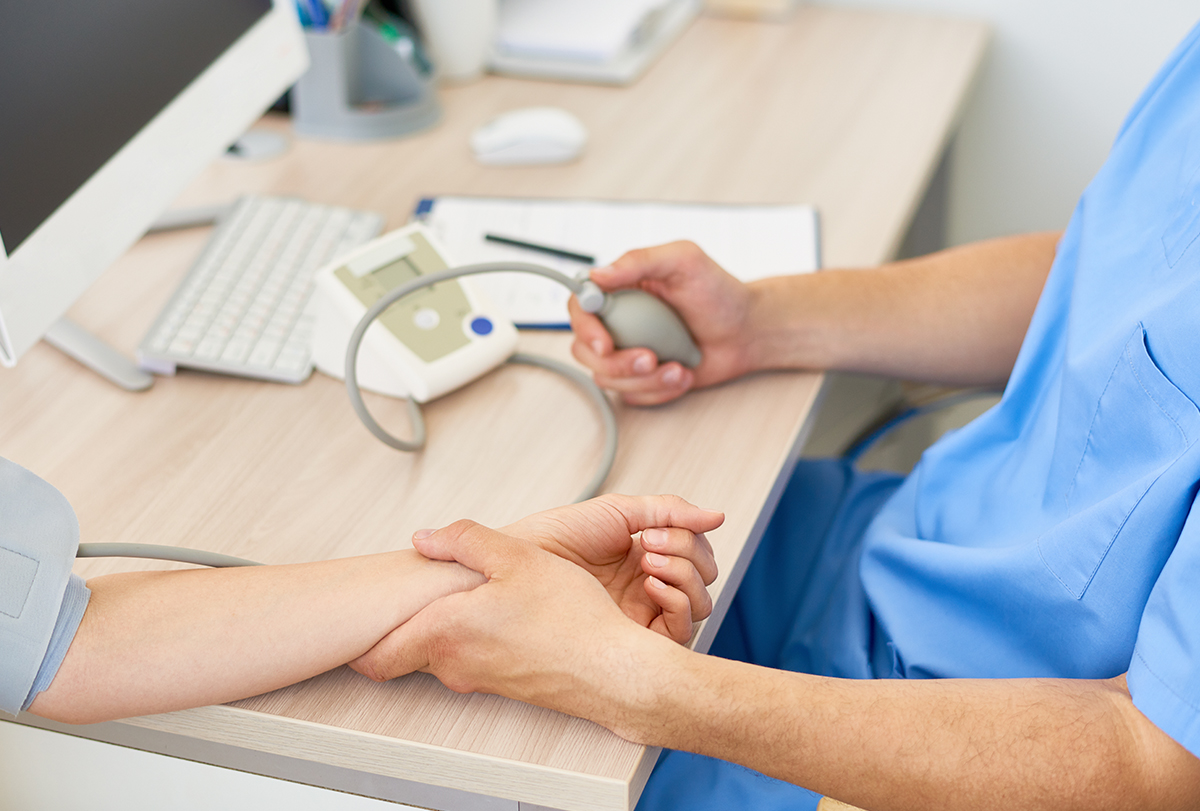
Note: The focus of World Hypertension Day 2023 was “Measure Your Blood Pressure Accurately, Control It, Live Longer.” (1)
Hypertension occurs when your systolic blood pressure is ≥140 mmHg while your diastolic blood pressure is ≥90 mmHg. If not managed, high blood pressure can lead to severe health difficulties. (2)
But fear not! By understanding the risk factors associated with hypertension, you can take proactive steps to manage your blood pressure and safeguard your health.
This article will present the various risk factors for high blood pressure in an easy-to-understand manner.
Factors That Contribute to Hypertension
These factors can pave the way for high blood pressure.
1. Aging (especially >60 years)
As age increases, the danger of suffering from hypertension also increases. This means that as each year passes, the likelihood of going from having prehypertension (slightly elevated blood pressure) to full-blown hypertension also goes up.
One study found that for every year that goes by, the risk of progressing to hypertension increases by about 1.05 times. (3) This can be because aging is associated with chronic inflammatory response and inflated oxidative stress, which are factors linked to heart diseases. (4)
Hypertension is even more prevalent among older adults and contributes significantly to cardiovascular disease-related expenses and health issues. In fact, 70% of older adults have hypertension compared to 32% of adults aged 40–59 years. (4)
Moreover, about 66% of people older than 65 years suffer from high blood pressure. Even if your blood pressure is normal when you’re younger, there’s a 90% possibility of you having hypertension by the age of 55, according to experts.
So, as you age, it becomes even more crucial to watch over your blood pressure to stay healthy.
2. Obesity and high BMI
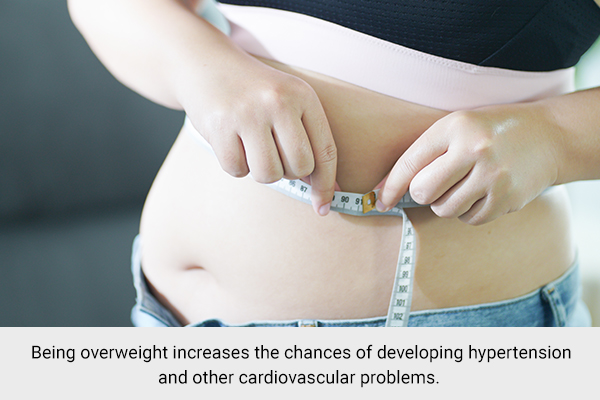
When it comes to the risk of developing hypertension, obesity plays a significant role. Researchers have consistently shown that being overweight increases the chances of developing hypertension and other cardiovascular problems. (5)
In one study, the majority (51.06%) of those with hypertension had a BMI between 25 and 30, followed by those with a BMI between 30 and 35 (25%). (6) Experts recommend losing weight till you reach a BMI of 18.5–24.9.
Obesity can lead to metabolic abnormalities and affect how the cardiovascular system functions, even at a young age. Obesity can activate systems in the body that regulate blood pressure and impair the function of blood vessels.
Interestingly, the relationship between obesity and hypertension is a two-way street. Being obese increases the risk of developing hypertension by 954%, but hypertensive individuals also tend to be more prone to weight gain. This suggests a reciprocal relationship where both conditions can affect and aggravate each other. (5)
Managing weight and maintaining a healthy lifestyle are crucial for preventing and managing these conditions.
3. Family history of hypertension
One important risk factor for hypertension that cannot be changed is family history. This means if your parents, grandparents, or siblings have had hypertension, you are at an increased threat of developing it too.
Researchers found that people with a family history of hypertension were more likely to have high blood pressure, obesity, central obesity (excess fat around the waist), and metabolic syndrome (a cluster of conditions that increase the risk of heart disease, stroke, and diabetes). (7)
This suggests that those with a family history of hypertension should work on prevention and early detection of high blood pressure and implement targeted interventions such as lifestyle changes to reduce the risk of hypertension
4. Dietary factors
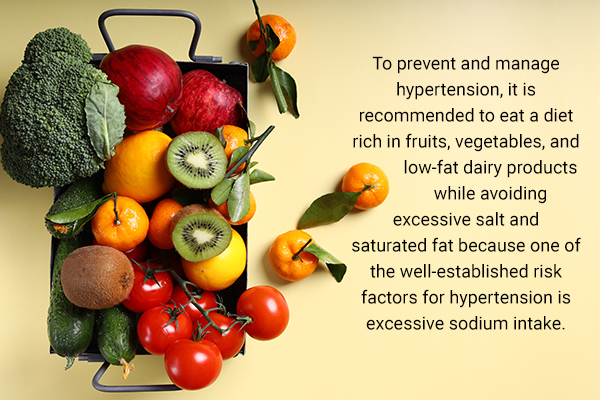
Research has shown that diet plays a critical part in blood pressure management and the severity of hypertension. Several foods can offer protection from hypertension, while others can expand the threat of suffering from it.
To prevent and manage hypertension, it is recommended to eat a diet rich in fruits, vegetables, and low-fat dairy products.
Also, excessive salt and saturated fat must be avoided because one of the well-established risk factors for hypertension is excessive sodium intake. Consuming too much salt can lead to hypertension. (8)
Many patients claim that they consume less salt at home, but they forget bread, biscuits, and pickles brought from markets, which contain high levels of salt.
According to the World Health Organization (WHO), the global salt intake is roughly 10.8 g per day, which is greater than double the WHO recommendation of less than 5 g of salt, which is around 1 teaspoon, daily. (9)
Another study found that increased consumption of salted seafood and a scarce consumption of eggs and meat were linked with a high chance of getting hypertension. Those who consumed a lot of salted seafood had a 28% higher risk of developing hypertension compared to those who consumed less. (10)
Simultaneously, low intake of potassium also contributes to hypertension. (11)
In short, implementing dietary strategies can help prevent and manage hypertension.
5. Lack of physical activity
Not getting enough physical activity can raise the chances of developing hypertension.
Exercise improves blood flow and releases hormones that relax the blood vessels, helping lower blood pressure. Conversely, not being physically active can lead to weight gain, which further increases the risk of hypertension as healthy weight is important for managing blood pressure. (11)
Researchers have shown that moderate-level to high-level physical activity, especially aerobic exercises such as brisk walking and cycling, when done routinely, can lower the risk of developing hypertension. (12)
Recommendations include regular aerobic physical activity for a minimum of 30 minutes per day. (13)
6. Smoking

Smoking is a big risk factor for heart problems. Smoking affects your blood vessels and makes it easier for dangerous things to build up in them. This can cause health issues such as heart attacks and strokes.
Smoking can also make your blood pressure go up in the short term because it makes your body more stressed out.
Even though there isn’t clear evidence that smoking causes high blood pressure in the long term, it can still cause damage to your arteries and make your blood pressure worse. (14)
The fairest thing you can do for yourself is to quit smoking or never start if you’re a nonsmoker.
7. Persistent stress
When you’re stressed, your body releases chemicals that can increase your heart rate and blood pressure.
If you frequently experience stress and your body doesn’t return to normal after the stress is gone, long-term high blood pressure can develop. It’s a never-ending cycle of pressure on your arteries.
When you keep thinking about stressful events in a negative way (called rumination), your blood pressure can stay elevated for longer periods. It’s like your mind and body are teaming up to keep your blood pressure in the danger zone. (15)
Research suggests that chronic psychosocial stress, including discrimination, can contribute to the development of hypertension.
So, remember that reducing stress is equivalent to taking care of your blood pressure and giving your body a much-needed break from the pressures of life.
8. Excessive alcohol intake
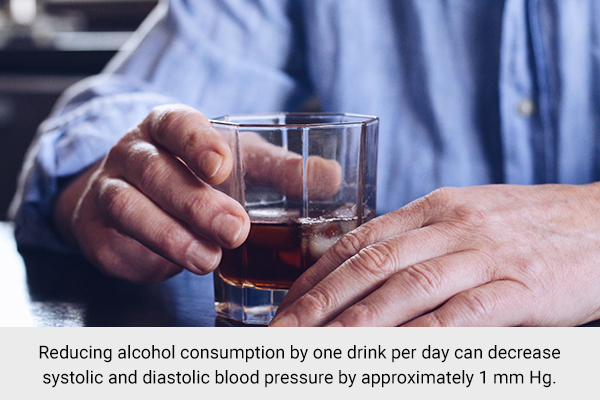
Drinking too much alcohol can increase your threat of developing hypertension (16) Observational studies have shown that consuming three or more alcoholic drinks daily is linked to hypertension.
In clinical trials, it has been observed that reducing alcohol consumption by one daily drink can decrease your blood pressure by around 1 mmHg. This decrease in numbers may appear pretty small, but it can make a difference in managing hypertension.
For individuals with hypertension who drink excessively, a reasonable goal is to limit daily alcohol intake to one drink for females and two drinks for males, unless contraindicated for other reasons. (17)
9. Gender
The likelihood of suffering from hypertension can vary between men and women. Before the age of 65 years, men have a higher likelihood of experiencing high blood pressure than women.
However, once women reach the age of 65 years, they become more prone to developing high blood pressure than men. (16)
It’s important to keep track of your blood pressure as you age, regardless of gender, and take the necessary steps to maintain a healthy lifestyle.
10. Pregnancy

During pregnancy, high blood pressure can occur. Several factors increase the risk of developing hypertension during pregnancy, including conditions that affect blood flow to the placenta, such as preexisting hypertension, renal disease, diabetes, obstructive sleep apnea, thrombophilia, and autoimmune disease. (17)
Note: It’s crucial to understand that treating hypertension in pregnancy is different because certain medications used to lower blood pressure can harm the developing baby.
11. Hormone replacement therapy (HRT)
Research has found that women who used hormonal therapy had a slightly higher risk of developing hypertension compared to those who never used it.
Specifically, the use of oral estrogen in combination with certain progestogens was associated with a higher risk. However, the risk increase was modest.
It is important for women undergoing hormonal therapy to monitor their blood pressure regularly as part of their healthcare routine. (18)
12. Race
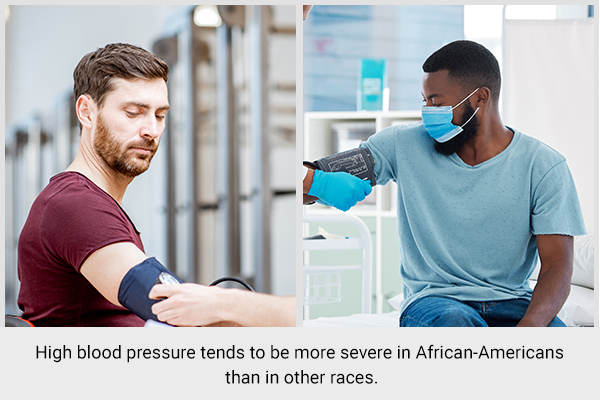
High blood pressure is seen more in African-Americans than in other races. It tends to be more serious in African-Americans too. Moreover, some drugs for treating hypertension are also less effective in African-Americans. (16)
Most-Asked Questions About High Blood Pressure
What is considered normal blood pressure?
Ideal blood pressure is generally around 120/80 mmHg.
What is the difference between systolic and diastolic blood pressure?
Systolic blood pressure represents the pressure in the arteries when the heart contracts, while diastolic blood pressure is when the heart is at rest.
Can hypertension be cured?
Hypertension cannot be cured, but it can be managed through lifestyle changes and medications.
Can hypertension be hereditary?
Yes, genetics can play a role in the development of hypertension.
Can hypertension be managed without medication?
In some cases, lifestyle modifications alone may be sufficient to control blood pressure. However, each case is unique, and medication may be necessary for some individuals.
If your blood pressure is consistently high or not responding to lifestyle changes, medication may be prescribed. While there is no cure for primary hypertension (high blood pressure with no known cause), certain underlying causes of secondary hypertension can be addressed.
However, it’s important to note that only about one-third of hypertensive patients in the United States are able to achieve the desired blood pressure levels with treatment.
What’s the target blood pressure?
The general target for blood pressure in most patients is below 140/90 mmHg. However, for individuals with kidney disease or diabetes, the goal is to lower blood pressure even further, to below 130/80 mmHg or as close to this level as tolerated.
How often should blood pressure be checked?
Blood pressure should be checked regularly, as recommended by your healthcare provider, to monitor any changes and ensure proper management of hypertension.
Final Word
Hypertension is a serious condition that can lead to serious health problems if left unmanaged. Knowing and addressing the risk factors can greatly reduce the likelihood of developing high blood pressure and its complications.
Regular checkups and a healthy lifestyle can go a long way in maintaining optimal blood pressure levels and overall health.
- Was this article helpful?
- YES, THANKS!NOT REALLY


